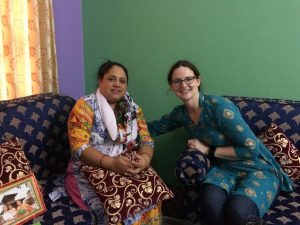
security guard in Qatar
Cynthia Enloe begins her article Mundane Matters with the statement: the everyday, by definition, is banal, unimportant and inconsequential. She’s right. What does the everyday offer to politics and the study of global private security. How does paying attention to the families who cook and clean for the security leaders and business directors possibly improve our analytics on the industry? In what ways do the ritualised and tedious office tasks of emailing, the banter during coffee room breaks and pre-meetings actually matter? The everyday is pre-political, uninteresting and routine.
And yet, as Enloe goes onto convincing argue in this same article, the everyday is profoundly political. In fact, Enloe’s life work is all about connecting everyday in global politics. Other feminists and critical political economists take up Enloe’s politics. They remind us that states, militaries and markets all take vested interest in the everyday in order to sustain broader geopolitical/economic practices. Critical military scholars such as Joanna Tidy, Victoria Basham, Alex Hyde and Linda Ahall have highlighted how the everyday is an important space/temporal imagining where militarism, war and violence get practiced, normalised and seen as unfortunate but necessary. This involves both soldiers and civilians and occurs not only in the military ranks, but in the household, during protests and spaces of military remembrance.
Political economy feminists like Marsha Henry, Genevieve Le Baron, Juanita Elias and Adrienne Roberts, Amanda Chisholm and Saskia Stachowitsch, Matt Davies and Anna Agathangelou have pointed to how the everyday is a space continually acted upon in global gender and capital relations. They have shown how neoliberal market relations and state restructuring of social services has significantly impacted the household—and the woman who continue to face a double (sometimes triple) burden of managing care/reproductive work in the home, caring for elderly/ageing parents, and seeking often precarious, flexible work outside the home. These feminists have demonstrated the diverse ways in which everyday continues to shape and make possible exiting gendered capital social relations. They have also convincingly highlighted how gender, class, and colonial relations underpin these global/everyday divides.
Taking the everyday seriously in global private security, I argue, improves our analytics of where we locate security operations and how we track its movements. It broadens who we understand as security actors and accounts for the profound ways the industry is shaping our lives. The current scholarship on private security is preoccupied with the global. Private Security is between states and market actors. It is where agreements on transparency, regulations and accountability measures get drawn up. It is the laws that condition the market engagements. The people we locate in these global practices are the privileged, often white, and mostly men. They are the company directors and state leaders. It is a space/time where the tough decisions are made—where ingenuity and the big deals occur.

Post interview with a wife of a Gurkha security contractor
Alternatively, the everyday is where the banal and the residual occur. It is the negation of global politics. It is a space were mostly women (as mothers, wives, nannies, sex workers, cleaners) reside. It is their mundane rituals of housecleaning, child rearing, sexual pleasuring and food shopping occur. Similarly, the everyday it is also about the ritualised encounters between the directors and their colleagues, the elevator conversations pre/post meetings and the coffee/pub chats. It is a space/time that must be constantly flexible, to endure the changes and movements of the global security market.
This divide, as feminists remind us, is by political design. It is neither natural nor inevitable. Feminism has trained us to ask: who benefits from this divide? In the security industry the divide between global and everyday allows us to de-politise the very households/family architectures, which render the global extraction of labour possible. Hyde describes how similar divides allow the female spouses of British soldiers to become the reserve-reserve force of the British army with their household labour-silenced yet indispensable to how the UK military functions. How are the households expected to shape their lives around the global security market?
In my own research, the everyday begins to render visible the men (and sometimes women), particularly from the global south, who are signing up to 1-2 year long rotations with 1 month leave and for the significantly lower pay grade than their westerners counterparts. It highlights how martial race, particularly of Gurkhas, renders them more amenable to foreign armed security work because of their associated histories with the British military. It accounts for the household emotional/reproductive/life sustaining work in running the family of a migrant worker. How foreign work has improved but also had a social cost to how families are organised and the material conditions of possibilities afforded to them. It also brings to light the localised poverty/lack of development, which renders the security migrant amenable to foreign work in the first place—which conditions their employment conditions and makes them compliant/resilient to market demands.
Taking the everyday as a space/time and a feminist critique seriously accounts for the men and women who actually produce security markets. It sees the market not as a benign space where actors must continually respond, but as a space that is shaped by the social relations between people. It is a space that is productive of the very gendered and raced relations we are conditioned by. It can also be a space of resistance. The everyday allows us to consider the people that shape these politics—those that fix the rules and benefit from them and those that are expected to endure adapt and cope.
These politics manifest in different ways. My co-authored work with my colleague Saskia Stachowitsch’s shows who benefits from the political segregation between the everyday and the global. It argues that such a separation allows the security industry to extract security labour without properly accounting for the unpaid necessary labour of the home—and how militarization of the home, in particular the Gurkha home, has made recruitment much easier.
Accounting for the everyday broadens our understanding of who is shaping and shaped by the security industry and the structures that continue to underpin the industry’s operations. It enables us able to consider how neoliberalism, militarism, race and poverty continue to inform the extraction of a global reserve security labour force. We can ask what work must the family do in sustaining a healthy security worker? How is resilience, in the ability for families to endure, to adapt, to perpetually adjust to migrant work demands, an integral feature of labour extraction in global security? I what ways does depletion and disposability, inform how we come to understand some men and women as disposable and replaceable and others as high value and irreplaceable?

Security Labour Company Clothing and Supply Store
The everyday is not pre-political or inconsequent. It is fundamental to how global economies and politics are sustained. Accounting for the everyday sharpens our analysis and allows us to be mindful of the broader politics that continue to quarantine the everyday as a location of unimportance. Politics of militarism, capitalism and colonialism that (re)produce divides of private/public, local/global, good/bad/disposable labourer. These divides are always political and it is through a feminist curiosity that we are encouraged to continue to question, to make queer, the politics of everyday/global divides. It is these questions that must continue to frame our analysis of the security industry.
